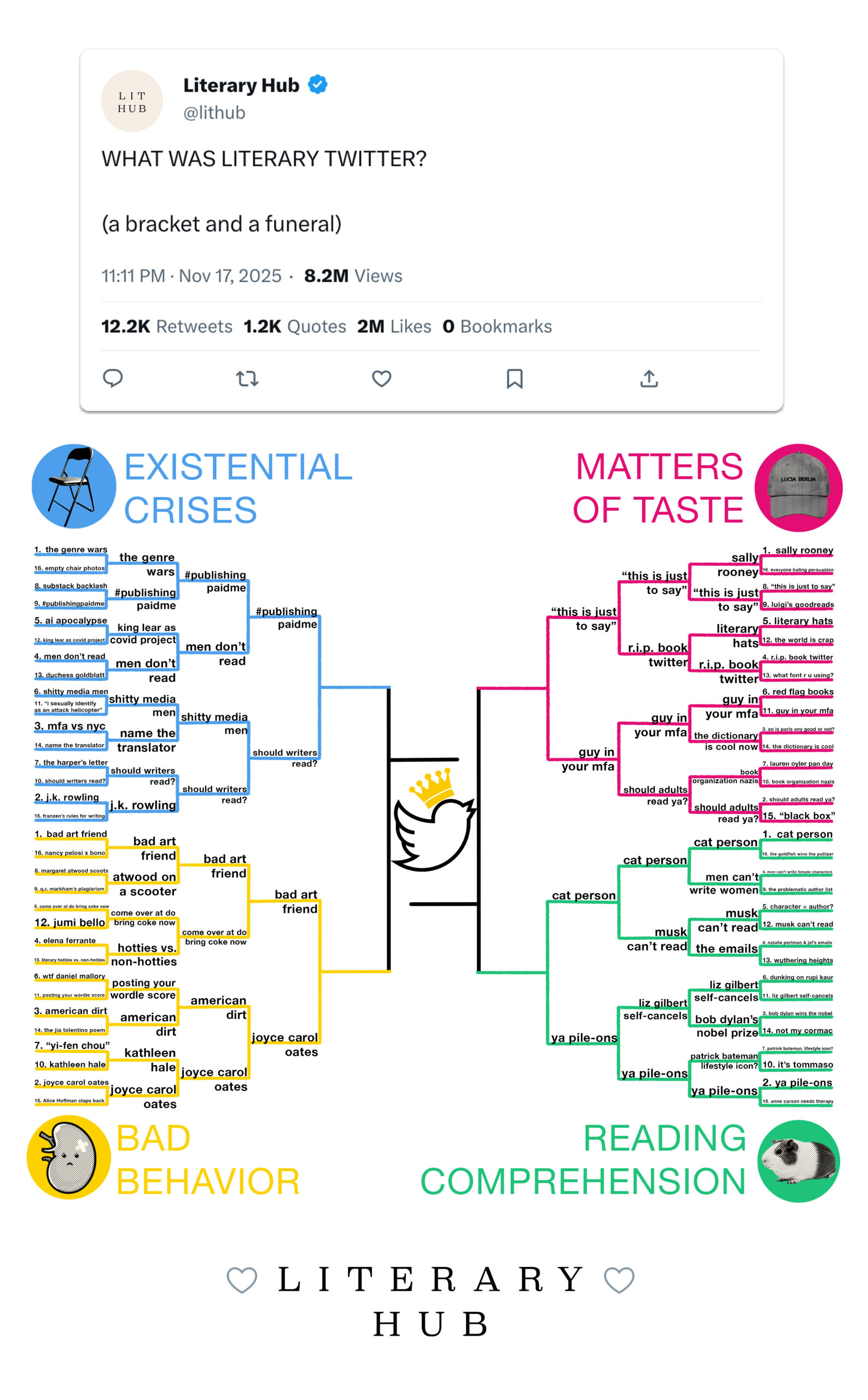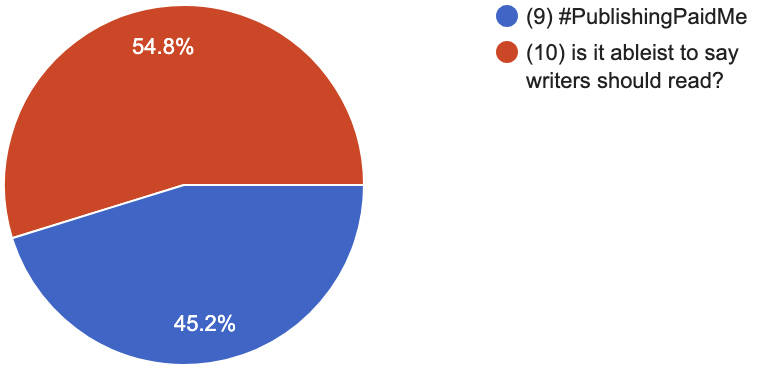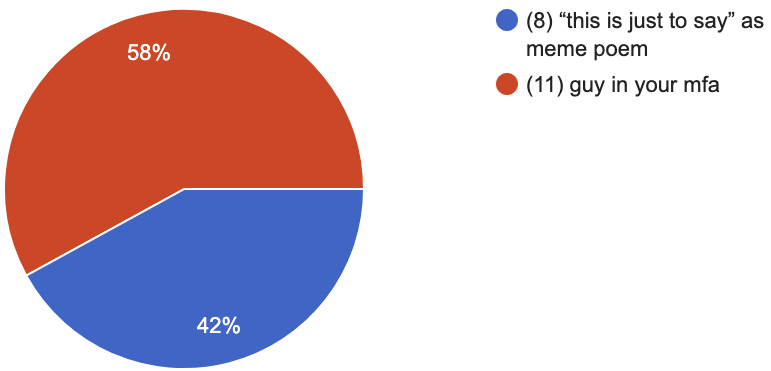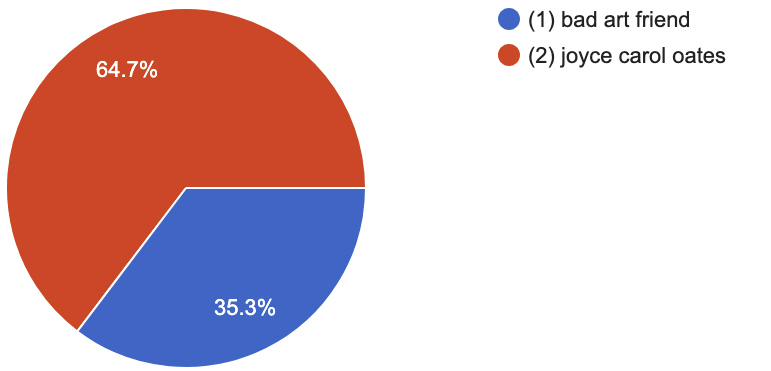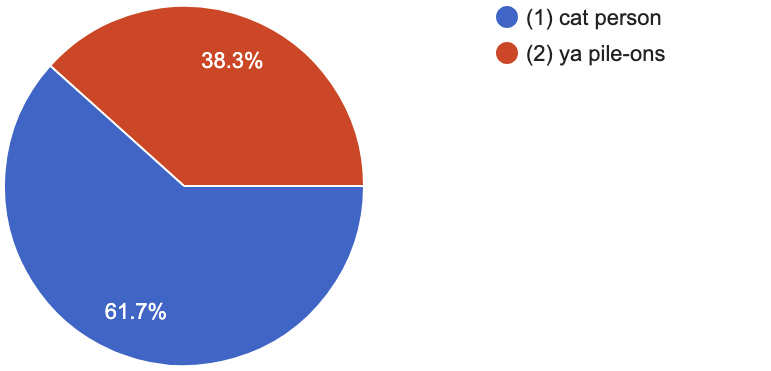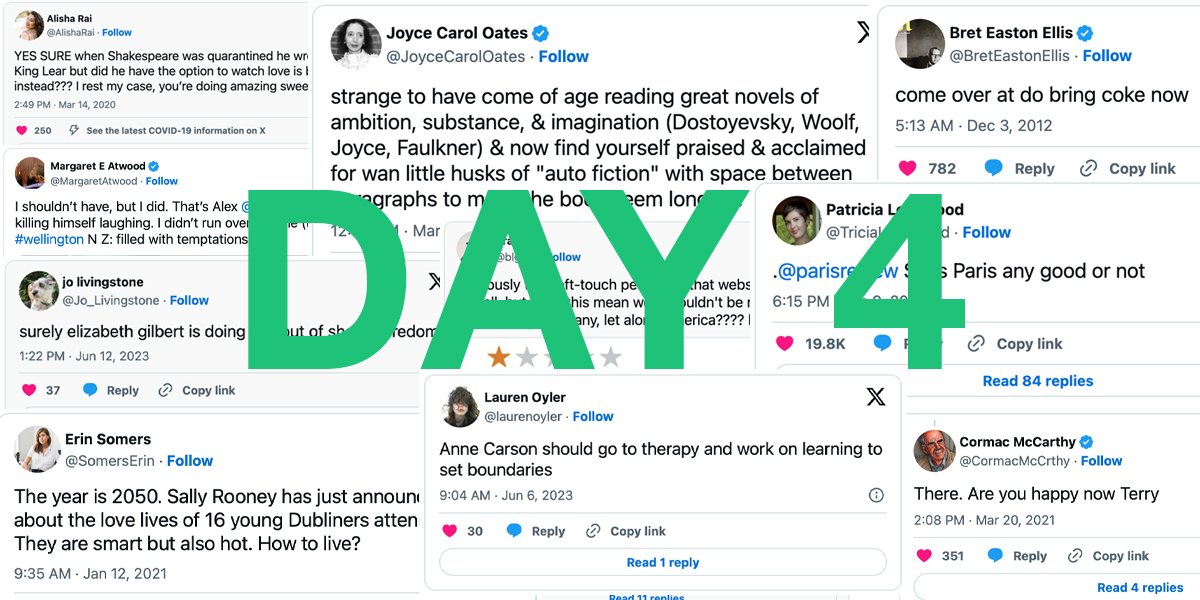
What Was Literary Twitter? The Bracket *Day 4*
The friends we made along the way
It’s day four, and only 8 out of original 64 are left after yesterday’s voting! The polls today will determine who wins their quadrant (or is it “region”? Or “zone”? We’re not sports people) and advances to the semifinals.
It’s starting to get down to the wire, with some very big Twitter moments getting eliminated yesterday. It was a bad day for bad men—the shitty media men list and the men don’t read discourse both lost—and big debates—the literary world leaving Twitter and should adults read YA? both got 86ed.
The Bret Easton Ellis “come over at do bring coke now” party Tweet was knocked out by bad art friend. Fitting for the day after the National Book Awards when we’re all a little sleepy and a few people could probably use a new kidney.
But today, you have four big match-ups to vote on. I’ll be watching the returns on the meme match-up, if you will, between William Carlos Williams’ “This Is Just To Say” poem and the satirical Twitter persona @GuyInYourMFA. I can definitely imagine MFA Guy being very salty in a workshop about what the Williams poem has become, while secretly sending a lot of plum parody poems in DMs.
And Joyce Carol Oates vs. bad art friend is a big face-off with finals level energy. I’m favoring JCO since she’s dominated every match-up so far, but who knows what could happen.
Readers, it’s up to you! The polls are open!
Behold, the updated Bracket:
[Click to enlarge]
*
Rules
Now that Literary Twitter is dead, we’re asking, “What was it?” In this bracket, we’re seeking the Most Literary Twitter moment, discourse, or personage. What has been stuck in your mind, who sent you running to your group chat, what kept you scrolling for longer than you should have? What are you still bringing up in conversation today and having to explain to people with normal brains? In short, what most exemplified whatever the hell Literary Twitter was?
We’ve sorted all of the contenders (that we can remember) into four categories: Existential Crises, Matters of Taste, Bad Behavior, and Reading Comprehension. Each quadrant’s winner will face off on Friday, before the final head-to-head on Monday, November 24th to crown our winner.
*
Voting Schedule
Round of 64 Character Limit: Voting open now until tonight at 7:00 PM EST (Check out the results from the first round here)
Round of “dang, only 32 likes?”: Voting open Tuesday, November 18th from 10:00 AM – 7:00 PM EST (Round two results are here)
Round of “sweet, 16 new followers”: Voting open Wednesday, November 19th from 10:00 AM – 7:00 PM EST (Results from this round, here)
You are here –> The Retweeted 8: Voting open Thursday, November 20th from 10:00 AM – 7:00 PM EST
The Quarter Finals: Voting open Friday, November 21st from 10:00 AM, until Sunday November 23rd at 7:00 PM EST
The Finals: Voting open Monday, November 24th from 10:00 AM – 7:00 PM EST
And the winner will be announced on Tuesday, November 25th!
*
How To Vote
We’ve got handy voting forms embedded below. Like looking back at the old Twitter interface, they’re a little ugly, but they get the job done. Simply select which of the two discourses you think should advance, and we’ll tabulate the votes at the end of each day.
*
Scroll on….
#PublishingPaidMe (9) vs. is it ableist to say writers should read? (10)

#PublishingPaidMe (9)
Trending Because: At its best, Twitter was amazing as an organizing tool: you could yell at powerful people who were usually holed away in their ivory towers and you could share information they were trying to hide from the rest of us. Black writer L.L. McKinney started the hashtag #PublishingPaidMe to draw attention to the disparity between what Black and white authors were getting paid for deals. And it took off: Big name authors joined in to share what they made, and it got the attention of publications like The Times, NPR, and Vulture too. As much as people poo-pooed Twitter organizing as slacktivism, this sort of crowd-sourced transparency had its uses.
Retweeted by: The angry and underpaid
VS.
is it ableist to say writers should read? (10)
Trending Because: The trick to Twitter was to be just popular enough. There has always been a hard ceiling on the benefits of virality: you want to be popular, but never the main character.
One of the most searing examples of this dynamic was when Ana Mardoll got the main character treatment after posting a now deleted Tweet saying it’s ableist to expect writers to read. Weird stuff, by all accounts, and this was such an attention-grabbing take that it also led people to discover that Mardoll was a neoptism hire at the giant weapons company Lockeed Martin, in addition to being a writer. If you don’t remember the details (and want to), Brandon Yu helpfully rounded up the whole story here.
Writing, building bombs, and posting wild takes? That’s the American Dream right there.
Retweeted by: Drone pilots who love YA
*
“this is just to say” as meme poem (8) vs. guy in your mfa (11)
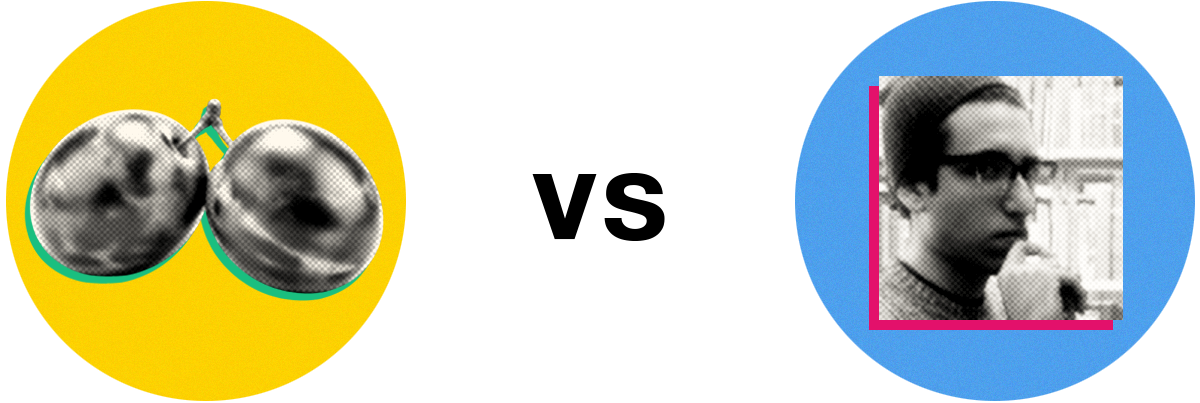
“this is just to say” as meme poem (8)
Trending Because:
This is just to say
you have seen
the William Carlos Williams meme poems
that were started
as early as the ‘60s
and which
you have probably
memed
for yourself
Forgive me
they’re all so delicious
so sweet
and so everywhere
Retweeted By: The aspiring poet in all of us and wicked, unapologetic plum thieves
VS.
guy in your mfa (11)
Trending Because: Maybe the most memorable Literary Twitter bit account, just edging out @Kim Kierkegaardashian. @GuyInYourMFA embodies the worst version of the stereotypical dude writer who has both too much and too little to say. The tweets nailed the voice of this workshop menace, who was full of references, ideas for novels, takes on feminism, new Moleskines, spelling opinions, musings on writing women, and so much more. And not to brag, but we got to interview “him.”
Retweeted By: Anyone who has taken a workshop with one of these guys
*

bad art friend (1) vs. joyce carol oates (2)
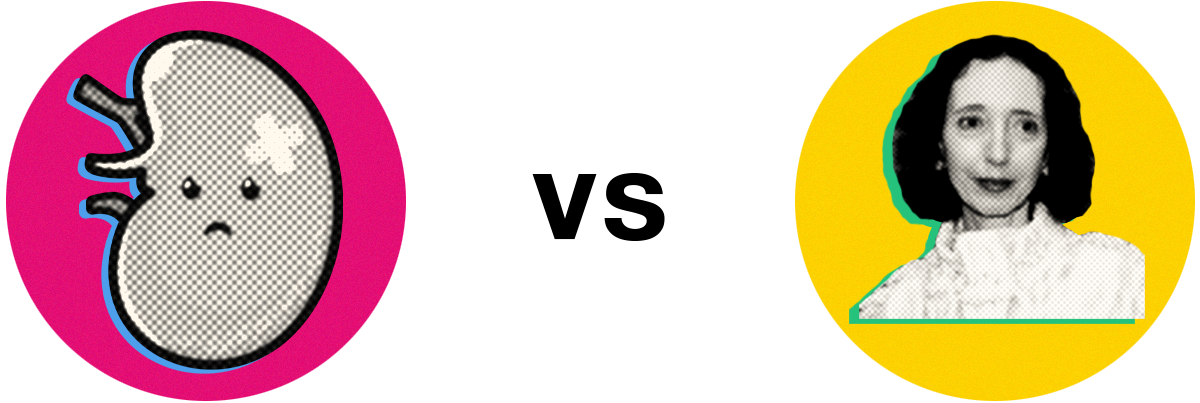
bad art friend (1)
Trending Because: Bad Art Friend was the biggest literary story—Twitter or otherwise—of 2021. In case you’ve blocked it out, it all started on October 5, when Robert Kolker published a feature article in The New York Times entitled “Who Is the Bad Art Friend?”. The saga within is almost too convoluted to summarize, but basically, back in 2015, a writer named Dawn Dorland donated one of her kidneys to a stranger and posted about it on Facebook—only to find, sometime later, that another writer, Sonya Larson, an acquaintance via the Boston nonprofit writing org GrubStreet, had written a short story about kidney donation that seemed to borrow heavily from her Facebook posts. Lawsuits, and some staffing changes at GrubStreet, not to mention everyone turning off their history, ensued.
Literally everyone seemed to have a take on this, even people not usually on Literary Twitter. Some read the article and concluded that Dorland was the Bad Art Friend. Others thought it was Larson all along. As our own Walker Caplan put it at the time: “The lesson of “Bad Art Friend” is Cover your tracks when writing fiction about real people; or it’s Never pitch articles about yourself; or it’s Don’t extensively insult your acquaintances in group chats lest they be subpoenaed; or it’s The conflation of friendship and professional connection that the writing world necessitates isn’t good for anyone.” (Lit Hub’s official take is that donating kidneys is good.) It spurred major, frenzied discussions about writing communities, race, class, cringiness, mean girls, the literary industry at large, and of course, the literary internet itself. That’s what staring into a mirror when you are, yourself, a mirror gets you.
(By the way, in 2023 a court ruled that the Bad Art Friend was in fact, both of them.)
Retweeted by: Writers suddenly living in fear of their group chats being subpoenaed; AWP-goers
VS.
joyce carol oates (2)
Trending Because: Joyce Carol Oates is the demigod of Literary Twitter. This is a woman so prolific she writes a book a year and still has time to tweet about everything under the sun, the takes ranging from terrible to excellent to head-scratching to hilarious to the picture of her foot.
As Eric Thurm put it on this very website: “Like your mythical uncle, Joyce Carol Oates is, at heart, a troll. Prolific across all mediums, it is not difficult to imagine Oates delighting in the act of tweeting, of tossing thoughts into the world, both for the enjoyment of the craft and to see what happens, like tiny crystalline bombs. Joyce Carol Oates is very bad at Twitter, which is also to say she’s very good at Twitter.”
Also: the woman is 87! She just tweeted 3 minutes ago. All hail.
Retweeted by: Wan little husks
*
cat person (1) vs. ya pile-ons (2)
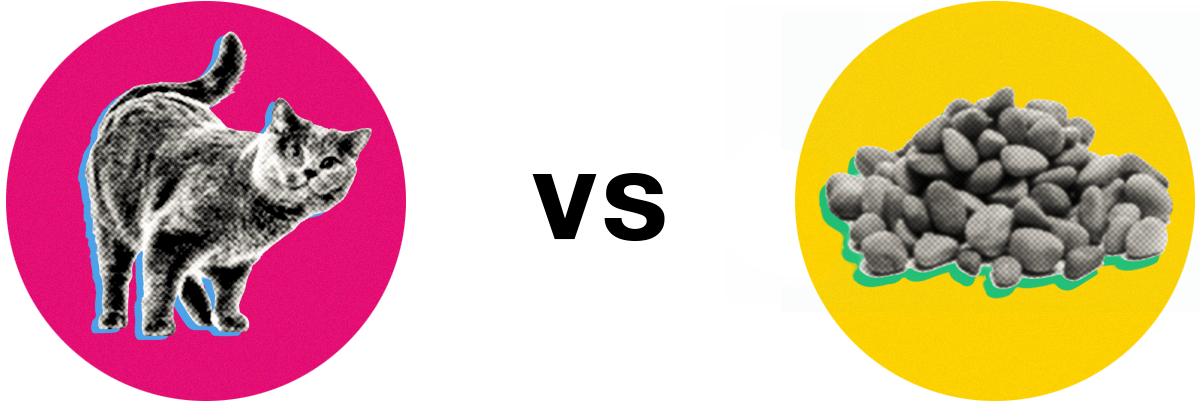
cat person (1)
Trending Because: In 2017, The New Yorker published a short story by a then-unknown writer, and within days it had gone viral. It would become the year’s second-most-read piece on the website, despite it being published in (checks watch) December. And again, a short story. Everyone was talking about it, even people who didn’t usually read fiction. (This was during the #MeToo movement.) Some of those people actually didn’t know they were reading fiction. Many women were in awe of how relatable it was. Many men felt they had to explain that it wasn’t that relatable at all. Some people bemoaned the fact that “relatability” was apparently important to readers; other people bemoaned the fact that some people were complaining about literature going viral. Fine.
But THEN, years later, a woman named Alexis Nowicki wrote an article alleging that “Cat Person” was based on her life. The debate about the story was instantly reignited, this time with a new bent: is it okay to steal the lives of others to write viral short stories and get seven figure book deals? Turns out there was actually no answer. Isn’t that always the way?
Retweeted by: People with ex-boyfriends
VS.
ya pile-ons, or ya twitter’s toxicity problem (2)
Trending Because: YA Twitter always seems to be embroiled in some sort of drama or pile-on that would be illegible even 15 years ago. Some of these takes would kill a small Victorian child.
It’s not always the YA fans who are acting out, the authors are behaving badly too. One of the most prominent cases was when bestseller Sarah Dessen zoomed in on a local news story where a student was quoted saying that Dessen’s books shouldn’t be included on a university “Common Read” list. Dessen crashed out spectacularly and pulled in her very famous author friends, starting “a minor Twitter riot” to gang up on the student. Even by YA Twitter standards, it got very ugly, very fast.
Retweeted By: The thin skinned









